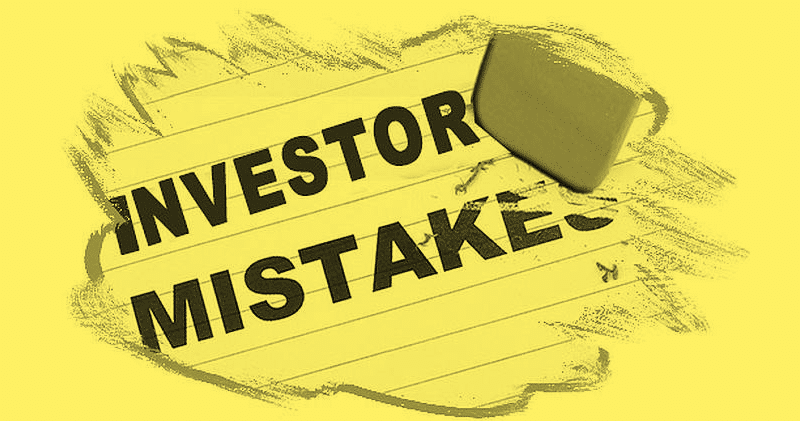
When you are learning how to invest, it is always better to learn from the best. However, learning through mistakes can also be beneficial for your future because it makes your base strong. Here is a list of most common investment mistakes to learn from so you know what to look out for. If any of these is familiar to you, it is time for you to seek assistance from a financial adviser.
Keep in mind that there is not much room for mistakes in investing and even a single mistake can lead to a huge loss of your capital.
Be Careful About Not Making These Mistakes:
Investing Without Clear Investment Goals
While investing, you must have a clear idea of where you are going, or you may end up somewhere else completely. An investor should plan everything according to the investment objectives; including the investment plan, the portfolio design, the strategies used, and the individual securities. Too many investors neglect designing an investment portfolio and instead they concentrate on the current investment or on maximising short-term investment return. However, it is the portfolio that can help you to achieve your long-term investment goals.
Not Creating A Diversified Portfolio
The only way you can create a portfolio with the potential of offering appropriate levels of risk and return in multiple market scenarios is ample diversification. Investors often think that they can maximize returns with a big investment exposure in one sector or security. However, the result of the market moving against such a focused position can be devastating. This is why you should go for a diversified portfolio. Then again, too many exposures and too much diversification also affect performance. So, you must find a balance. If you find it difficult to do it yourself, seek advice from a professional adviser.
Buying High And Selling Low
The basic principle of investment is buying low and selling high, yet so many investors make the mistake of doing the exact opposite. This happens because instead of taking decisions rationally, they make moves out of greed or fear. In most cases, investors buy high to maximise short-term returns instead of chasing long-term investment goals. By focussing on near-term returns, investors invest in the current investment craze or invest in the assets of investing strategies effective in the near past. Either way, when an investment becomes popular and gains the attention of the public, determining its value becomes more difficult.
Paying Too Much Commissions And Fees
If you invest in a high-cost fund or pay too much advisory fees, you are making a mistake because even a small increase in fees leaves a significant effect on wealth when it comes to long-term investment. Before you open an account, make sure to know about the cost of each investment decision. Go for funds with reasonable fees and check if you are receiving value for the advisory fees paid by you.
Too Often And Too Much Trading
Patience is a virtue when it comes to investing. It often takes time to get the benefits from the investments and asset allocation strategies. Continued modification or portfolio composition and investment tactics can reduce returns via greater transaction fees, and it can also lead the investor to take unanticipated risks that cannot be compensated. This is why you must always make sure to be on track. It is a good idea to use the impulse for reconfiguring your investment portfolio so you can learn about the instruments you hold better instead of as a push for trading.

Not Reviewing Investments On A Regular Basis
If you invest in a diversified portfolio, there are high chances of some things going up and some going down. As a result, your portfolio designed with careful planning may look very different at the end of a quarter or a year. Therefore, you must not get too far off track. Check in on a regular basis and make sense that your investments are still ideal for your situation. Most importantly, you need to prevent a condition where your portfolio would need rebalancing.
Allowing Emotions Interfere In Trading
Investing tends to bring up great emotional issues that may hinder decision making. Apart from the stress involved in trading, investors often have many questions in their heads. For example, they get worked up about whether they want to involve their spouse in planning their finances, or what they want to happen with their assets after their death. The immensity of these questions can get in the way of decision making. You may seek assistance from a good advisor who can help you to construct a plan that works in any condition, regardless of what the answers to those questions are.
Forgetting About Inflation
Investors usually concentrate on nominal returns and neglect real returns. It means that they see and compare performance after fees and inflation. You should know that some costs rise even when the economy is not in a huge inflationary period. It is essential for you to keep in mind what you can buy with your assets is a lot more important than their value in currencies. So, investors must discipline a discipline where they can focus on the real important factors which are the returns after adjusting for rising costs.
Not Controlling What Is Within the Control
Many investors always say that they cannot predict the future, but they neglect the fact that actions can be taken to shape it. It is true that you cannot control what the market will bear, but it is possible to try and save more money. If capital is invested over time continually, it can have as much influence as the ROI on wealth accumulation. It is the best way of increasing the probability to reach your financial goals.
Investing in various assets can be a great way of earning money, but you need to avoid making these mistakes if you do not want to lose your money.







